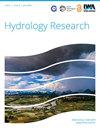变化条件下考虑变扬程的河流生态流量自适应计算
IF 2.4
4区 环境科学与生态学
Q2 WATER RESOURCES
引用次数: 0
摘要
摘要生态流量是水资源管理中为保护河流生态系统而对人类用水设定的约束条件。然而,水文条件的不确定性、调控能力的变化和时空差异给生态流量的实施和监管带来了困难。通过对生态流量相关概念和内涵的分析,认为适合实际应用的生态流量流态应该是一个动态区间,而不是一个固定值。为此,提出了一种改进的生态流量计算方法,即在确定生态基流的基础上,增加不同生态服务对象的可行举升量。以渭河两个断面为例,综合考虑来水、鱼类生存、景观、农业灌溉等因素,计算生态流量。结果表明:抬升量主要发生在高流量季节(4 ~ 6月),LJC断面和WJB断面最大生态流量分别为20.2和16.0 m3/s;该方法是一种广义方法,可推广到更复杂的水系,计算结果在综合调水中具有可靠性和适应性。本文章由计算机程序翻译,如有差异,请以英文原文为准。
Adaptive calculation of river ecological flow considering the variable lifting volume under changing conditions
Abstract Ecological flow is a restrictive condition set for human water consumption in water resources management to protect river ecosystems. However, uncertainties in hydrological conditions, changes in regulatory capacity, and temporal-spatial differences bring difficulties to the implementation and supervision of ecological flows. By analyzing the relevant concept and connotation of ecological flow, it is concluded that the ecological flow regimes suitable for practical application should be a dynamic interval rather than a fixed value. Therefore, an improved ecological flow calculation method was proposed, which is to increase the feasible lifting volume for different ecological service objects based on the determined ecological baseflow. Taking two cross-sections of the Weihe River as an example, the ecological flow was calculated by comprehensively considering the factors of inflow, fish survival, landscape, and agricultural irrigation. The result shows the lifting volume occurred in the high flow season (April–June), and the maximum ecological flow of LJC and WJB cross-sections was 20.2 and 16.0 m3/s, respectively. Moreover, it is a generalized approach that can be extended to a more complicated river system, and the calculation results have reliability and adaptability in integrated water regulation.
求助全文
通过发布文献求助,成功后即可免费获取论文全文。
去求助
来源期刊

Hydrology Research
WATER RESOURCES-
CiteScore
5.00
自引率
7.40%
发文量
0
审稿时长
3.8 months
期刊介绍:
Hydrology Research provides international coverage on all aspects of hydrology in its widest sense, and welcomes the submission of papers from across the subject. While emphasis is placed on studies of the hydrological cycle, the Journal also covers the physics and chemistry of water. Hydrology Research is intended to be a link between basic hydrological research and the practical application of scientific results within the broad field of water management.
 求助内容:
求助内容: 应助结果提醒方式:
应助结果提醒方式:


